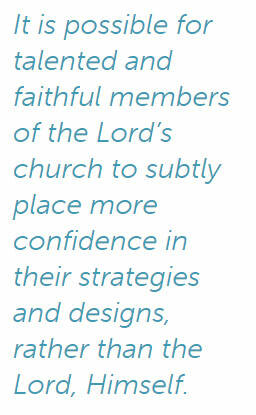“But he said to me, ‘My grace is sufficient for you for my power is made perfect in weakness.’ Therefore I will boast all the more the gladly of my weaknesses, so that the power of Christ may rest upon me” (2 Corinthians 12:9).
The Lord used a critical situation in Paul’s life to teach him that the ultimate hope of overcoming various trials (12:10) was the “power of Christ.” Raymond F. Collins suggests on this passage: “When Paul cites these words, his readers realize that it is the Lord’s power and his own weakness that he is writing about” (Second Corinthians, p. 241). It is often in the context of working out a faithful walk before the Lord that we are confronted … by our weaknesses.Would Paul have recognized his weakness and his need for the “grace…made perfect in weakness,” if there had not been situations enabling him to make this truth his own? If an apostle recognized such need, what of the need for such recognition by all members of the Lord’s own?
It is often in the context of working out a faithful walk before the Lord that we are confronted, through ways of the Lord’s choosing, by our weaknesses ranging from a lack of faith to outright rebellion. Wherever the weakness lies on this spectrum, the ideal for the minister of Christ is the recognition both of weaknesses and of the need for grace that enables.
In the previous reflection I had proposed, in line with Dr. Albino Barrera’s work, that the Church could have impact on the secular business world through informing and modeling certain principles. In sum, these were: an emphasis on the worth of a person, the concept of the common good, and the contribution of a theological anthropology that enables an understanding of how people flourish in the midst of the dynamics between the individual and the community.
My fear was that it would be easy for even sincere and faithful believers to give a degree of cognitive recognition and agreement to these potential contributions without sufficiently wrestling with what such contributions require in order to be fulfilled. Strategy and design on the part of believing individuals and churches could contribute much to the task of both informing and modeling said principles. The question would still be: upon what, or whom, is the foundation of trust? It is possible for talented and faithful members of the Lord’s church to subtly place more confidence in their strategies and designs, rather than the Lord, Himself. Vision and plans are needed, but members of the Lord’s own must remember the potential impact of their weaknesses. The Lord must orchestrate all that needs to happen for effective engagement. The accumulation of wealth and power never cease to be temptations and these are not overcome merely through intellectual recognition of the dangers.
informing and modeling said principles. The question would still be: upon what, or whom, is the foundation of trust? It is possible for talented and faithful members of the Lord’s church to subtly place more confidence in their strategies and designs, rather than the Lord, Himself. Vision and plans are needed, but members of the Lord’s own must remember the potential impact of their weaknesses. The Lord must orchestrate all that needs to happen for effective engagement. The accumulation of wealth and power never cease to be temptations and these are not overcome merely through intellectual recognition of the dangers.
Paul, like he mentions in Philippians 3:4-6, could have put his confidence for effective ministry before the Lord, in the fleshly realm of his pedigree and training. The Lord, however, trained him to understand his foundational need for grace. This recognition itself, is a demonstration of submission and obedience. To be effective in ministry in the church’s secular settings requires nothing less than a desperate dependence on the power of the Lord through the Spirit, to protect from potentially powerful temptations in the course of informing and modeling the ideals that Barrera sets forth.








Comments
Be the first one to make a comment!